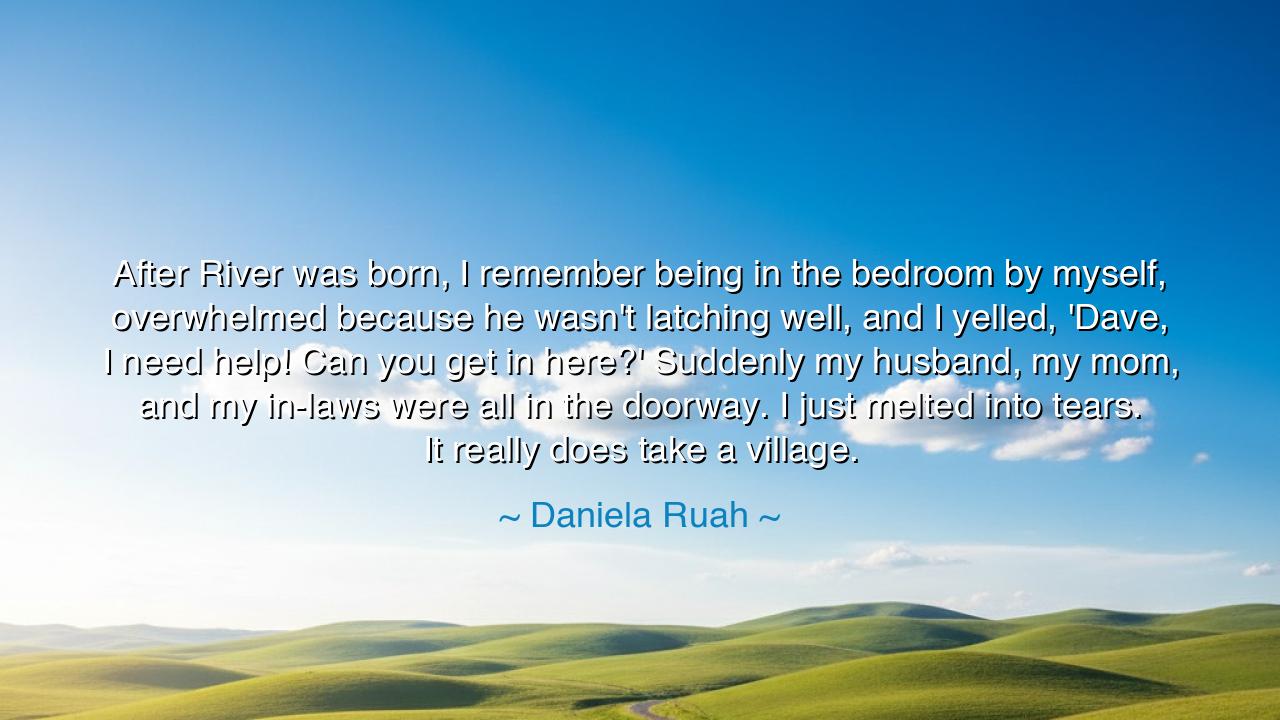
After River was born, I remember being in the bedroom by myself
After River was born, I remember being in the bedroom by myself, overwhelmed because he wasn't latching well, and I yelled, 'Dave, I need help! Can you get in here?' Suddenly my husband, my mom, and my in-laws were all in the doorway. I just melted into tears. It really does take a village.






When Daniela Ruah said, “After River was born, I remember being in the bedroom by myself, overwhelmed because he wasn’t latching well, and I yelled, ‘Dave, I need help! Can you get in here?’ Suddenly my husband, my mom, and my in-laws were all in the doorway. I just melted into tears. It really does take a village,” she spoke not only of her own struggle as a new mother, but of a truth that is as ancient as humanity itself — that no soul thrives alone, and that the strength to raise life is found not in isolation, but in the arms of community. Her words are a confession, a moment of vulnerability that blooms into wisdom. For in the cry of “I need help!” there lies not weakness, but the courage to reach for connection, to allow love to lift the weary heart.
In the earliest days of humankind, the elders taught that the child belongs to the tribe, not merely to one pair of hands. Mothers, fathers, grandparents, and neighbors all shared in the sacred duty of nurturing new life. This is the origin of the saying, “It takes a village to raise a child.” Daniela Ruah’s moment of exhaustion echoes that ancient understanding. Alone in the room, she felt the weight of new motherhood — the fear, the confusion, the love too vast to bear. But when she called out, love answered. Her family gathered not in judgment, but in unity. Her tears, falling freely, became a baptism — the surrender of solitude into the embrace of community.
The ancients would have called this the circle of life’s keepers — those who hold one another through the storms of becoming. When a mother falters, the circle closes around her; when a child cries, many hands reach to soothe. To see Ruah’s family appear in the doorway at her call is to see this sacred circle manifest before our eyes — the reminder that we are not meant to carry the burdens of love alone. Her story teaches that help is not a sign of failure; it is a sign of trust. To call upon others is to honor the divine truth that life itself is a shared endeavor.
Consider the tale of Naomi and Ruth from the ancient scriptures. Naomi, broken and bereaved, sought to send her daughter-in-law away, fearing she could offer nothing. But Ruth replied, “Where you go, I will go; your people shall be my people.” Through that bond of compassion, both women were healed. They became each other’s strength, and through their unity, a lineage was born that would one day lead to kings. So too, in Daniela Ruah’s story, the presence of family becomes a sacred act of restoration. When she could no longer bear the moment alone, the village arrived — not to solve everything, but simply to stand with her.
In our modern world, where independence is idolized and vulnerability mistaken for weakness, her words strike like an ancient bell: We are made for each other. The mother who calls for help is not failing; she is remembering. She is remembering that humanity was built upon shared fires, shared songs, and shared tears. The act of crying out — “I need help!” — is one of the most powerful and honest prayers a person can offer. And those who respond, as her husband, mother, and in-laws did, fulfill one of life’s holiest duties: to be present.
This story, though tender, carries heroic power. The battlefield of motherhood is not waged with swords but with sleepless nights, trembling hands, and fierce devotion. Daniela Ruah’s tears were not tears of defeat but of release — the moment she understood that she was not alone in her fight. That is the strength of community: when one heart falters, many hearts beat in its place until it finds its rhythm again. The village does not erase hardship, but it transforms it into belonging.
So, dear listener, take this wisdom into your heart: ask for help, and offer it freely. Do not let pride isolate you from the love waiting just beyond your door. Be someone’s village — the one who answers when another cries out in the dark. And when your own voice trembles with need, remember that calling for help is not a collapse, but a communion. It is the soul remembering its place in the great web of care that binds us all.
For truly, as Daniela Ruah learned in her moment of tears, it does take a village — not only to raise a child, but to raise each other, again and again, through every season of life.






AAdministratorAdministrator
Welcome, honored guests. Please leave a comment, we will respond soon